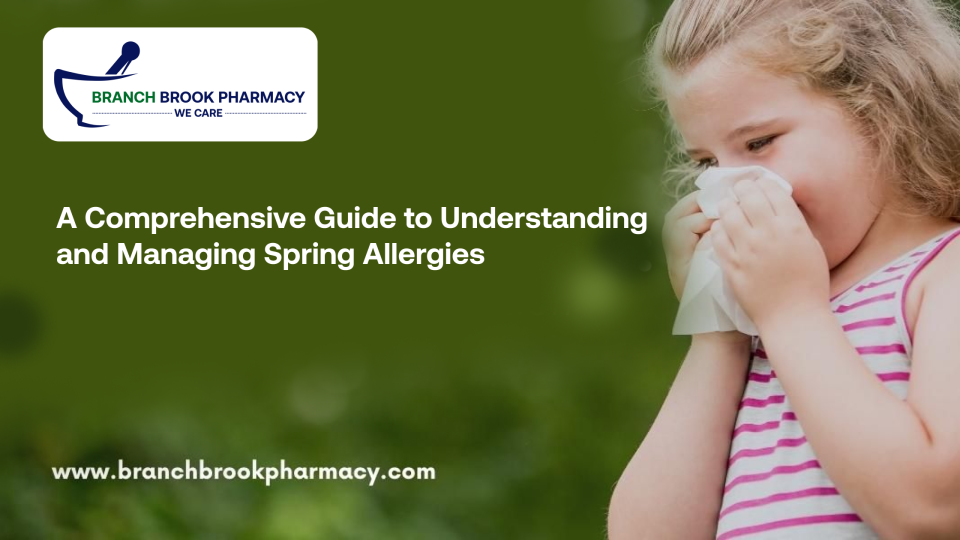
Spring is a season of renewal and beauty, with blooming flowers, warm sunshine, and longer days. However, for millions of people worldwide, spring also marks the return of an unwelcome guest: spring allergies. These seasonal allergies can disrupt daily life with symptoms such as sneezing, itchy eyes, and congestion, making it difficult to enjoy the season’s beauty.
This guide will provide a thorough understanding of spring allergies, including their causes, symptoms, prevention strategies, and treatment options. By equipping yourself with this knowledge, you can take effective steps to minimize discomfort and enjoy spring to the fullest.
What Are Spring Allergies?
Spring allergies occur when the immune system reacts to allergens, particularly pollen from trees, grasses, and flowers. As plants begin to bloom, they release pollen into the air, which can trigger an allergic response in sensitive individuals. Other common allergy triggers in spring include mold spores and pet dander.
When exposed to allergens, the body releases histamines, leading to inflammation and classic spring allergy symptoms like sneezing, runny nose, and itchy eyes. Understanding these triggers is the first step in managing seasonal allergies.
Common Symptoms of Spring Allergies
Identifying spring allergy symptoms is essential for distinguishing them from other conditions like colds or flu. Here are the most common symptoms:
- Sneezing
- Itchy, watery eyes
- Nasal congestion
- Runny nose
- Postnasal drip
- Coughing
- Wheezing
- Fatigue
- Headaches
Unlike a cold, spring allergies usually persist for weeks or months as long as allergens are present. They also lack symptoms like fever and body aches, which are common in viral infections. If you notice persistent symptoms during the spring months, it’s likely that you are experiencing spring pollen allergies.
Spring Allergy Prevention
As the saying goes, “Prevention is better than cure.” Taking proactive steps can help you avoid allergy triggers in spring and reduce the severity of symptoms. Here are some effective spring allergy prevention tips:
1. Monitor Pollen Counts
Pollen levels are typically highest in the morning and on windy days. Use weather apps or allergy trackers to check pollen forecasts and plan outdoor activities accordingly.
2. Keep Windows Closed
Prevent pollen from entering your home by keeping windows shut. Instead, use air conditioning to maintain a comfortable indoor environment. Consider investing in a HEPA filter to trap allergens effectively.
3. Practice Good Hygiene
After spending time outdoors, take a shower and change your clothes to remove any pollen. Washing your hands frequently can also prevent the spread of allergens.
4. Clean Your Home Regularly
Dust, vacuum, and wash bedding weekly to reduce allergens in your living space. Use a vacuum cleaner with a HEPA filter for better results.
5. Avoid Other Irritants
Smoke, pet dander, and mold can worsen spring allergy symptoms. Minimize exposure to these irritants whenever possible.
By implementing these spring allergy prevention strategies, you can significantly reduce your exposure to allergens and enjoy a more comfortable spring season.
Treatment Options for Spring Allergies
Despite your best efforts, spring allergies may still make their presence known. Fortunately, there are numerous allergy treatment options available to manage symptoms effectively.
1. Over-the-Counter Allergy Medications
OTC medications are a convenient and effective solution for seasonal allergy relief. Here are some common options:
- Antihistamines: These block the effects of histamine, reducing symptoms like sneezing, itching, and runny nose. Popular choices include cetirizine (Zyrtec), loratadine (Claritin), and fexofenadine (Allegra).
- Decongestants: These relieve nasal congestion by shrinking swollen blood vessels. Examples include pseudoephedrine (Sudafed) and phenylephrine.
- Nasal Sprays: Saline sprays can flush out allergens, while corticosteroid sprays like fluticasone (Flonase) reduce inflammation in the nasal passages.
2. Prescription Medications
If OTC products are insufficient, consult a doctor for stronger options. Prescription medications, including nasal corticosteroids and leukotriene receptor antagonists, can provide targeted relief for severe spring allergies.
3. Natural Remedies for Allergies
For those seeking a holistic approach, natural remedies for allergies can be helpful. Popular remedies include:
- Saline Nasal Rinses: Rinsing your nasal passages with saline helps remove allergens and relieve congestion.
- Local Honey: Consuming local honey may help your body adapt to local pollen, although scientific evidence is limited.
- Herbal Teas: Teas with antihistamine properties, like nettle tea, can soothe symptoms naturally.
Lifestyle Adjustments for Allergy Relief
In addition to medications and natural remedies, making lifestyle adjustments can significantly improve your ability to manage spring allergies:
- Stay Indoors During Peak Pollen Times: Limit outdoor activities in the morning or on windy days when pollen levels are highest.
- Use Protective Gear: If you must be outdoors, wear sunglasses to protect your eyes and a mask to reduce pollen exposure.
- Maintain a Balanced Diet: Foods rich in antioxidants, such as fruits and vegetables, can boost your immune system and help fight inflammation caused by allergies.
When to See a Doctor
While most cases of spring allergies can be managed with OTC solutions and lifestyle changes, severe symptoms may require professional intervention. If you experience persistent or worsening symptoms, such as difficulty breathing or chronic congestion, consult an allergist for specialized care. Allergy testing can identify specific triggers and guide personalized treatment plans.
Conclusion
Spring allergies can be a challenging part of the season, but they don’t have to keep you from enjoying the beauty of spring. By understanding their causes, recognizing the symptoms, and implementing effective spring allergy prevention and treatment strategies, you can minimize discomfort and regain control of your life.
Whether you opt for over-the-counter allergy medications, prescription treatments, or natural remedies for allergies, the key is to stay proactive. With the right approach, you can manage spring pollen allergies effectively and focus on what truly matters—celebrating the joys of spring!
Also Read: Pharma Marketing in a Nutshell – Branch Brook Pharmacy

